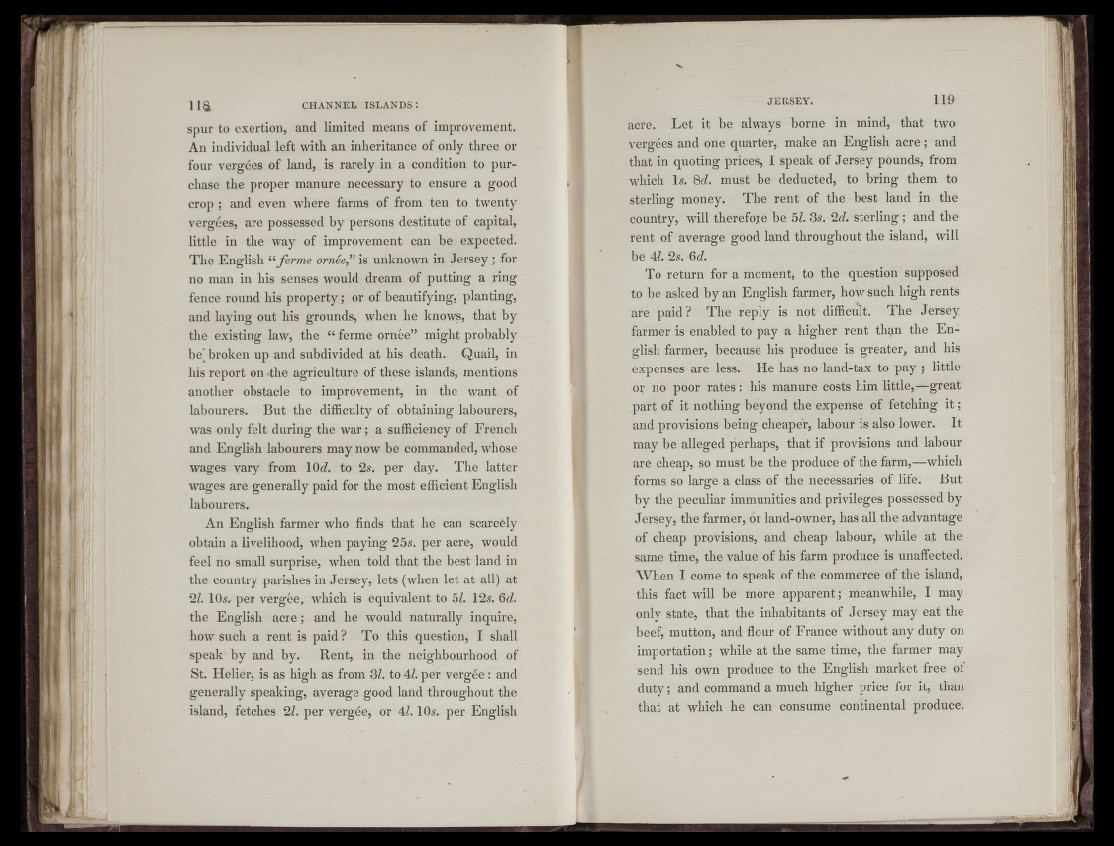
S i ' - r:5
I !
ï
rt
:
spur to exertion, and limited means of improvement.
An individual left with an inheritance of only three or
four vergées of land, is rarely in a condition to purchase
the proper manure necessary to ensure a good
crop ; and even where farms of from ten to twenty
vergées, are possessed by persons destitute of capital,
little in the way of improvement can be expected.
The English “ferme ornéef is unknown in Jersey ; for
no man in his senses would dream of putting a ring
fence round his property ; or of beautifying, planting,
and laying out his grounds, when he knows, that by
the existing law, the “ ferme ornée” might probably
be' broken up and subdivided at his death. Quail, in
his report on-the agriculture of these islands, mentions
another obstacle to improvement, in the want of
labourers. But the difficulty of obtaining labourers,
was only felt during the war; a sufficiency of French
and English labourers may now be commanded, whose
wages vary from 10c/. to 2s. per day. The latter
wages are generally paid for the most efficient English
labourers.
An English farmer who finds that he can scarcely
obtain a livelihood, when paying 25s. per acre, would
feel no small surprise, when told that the best land in
the country parishes in Jersey, lets (when let at all) at
21. 105. per vergée, which is equivalent to 51. 125. 6c/.
the English acre ; and he would naturally inquire,
how such a rent is paid? To this question, I shall
speak by and by. Rent, in the neighbourhood of
St. Helier, is as high as from 31. to 4/. per vergée : and
generally speaking, average good land throughout the
island, fetches 21. per vergée, or 4/. IO5. per English
acre. Let it be always borne in mind, that two
vergées and one quarter, make an English acre ; and
that in quoting prices, I speak of Jersey pounds, from
which I 5. 8c/. must be deducted, to bring them to
sterling money. The rent of the best land in the
country, will therefore be 51. 3s. 2d. sterling ; and the
rent of average good land throughout the island, will
be 4/. 25. 6d.
To return for a moment, to the question supposed
to be asked by an English farmer, how such high rents
are paid? The reply is not difficult. The Jersey
farmer is enabled to pay a higher rent than the English
farmer, because his produce is greater, and his
expenses are less. He has no land-tax to pay ; little
or no poor rates : his manure costs him little,—great
part of it nothing beyond the expense of fetching it ;
and provisions being cheaper, labour is also lower. It
may be alleged perhaps, that if provisions and labour
are cheap, so must be the produce of the farm,—whicli
forms so large a class of the necessaries of life. But
by the peculiar immunities and privileges possessed by
Jersey, the farmer, 6r land-owner, has all the advantage
of cheap provisions, and cheap labour, while at the
same time, the value of his farm produce is unaffected.
When I come to speak of the commerce of the island,
this fact will be more apparent ; meanwhile, I may
only state, that the inhabitants of Jersey may eat the
beef, mutton, and flour of France without any duty on
importation ; while at the same time, the farmer may
send his own produce to the English market free of
duty ; and command a much higher price for it, than
that at which he can consume continental produce.